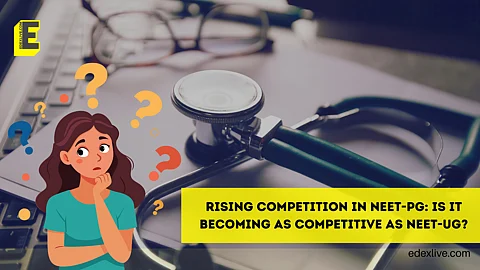

The growing debate surrounding the National Eligibility cum Entrance Test - Postgraduate (NEET-PG) with its increasing competitiveness mirrors concerns long associated with NEET - Undergraduate (UG).
Once viewed as a postgraduate exam for those pursuing specialisation, NEET-PG is now experiencing a surge in competition, similar to the intense pressure faced by NEET-UG candidates. As the number of MBBS graduates rises, the availability of postgraduate seats has not kept pace, heightening competition for limited spots.
This shift raises an important question: Is NEET-PG becoming just as competitive as NEET-UG?
Structural differences, similar pressures
Dr Utsav Bhattacharjee, Director, Reflex, Gooded Technologies Private Limited, explained that while the increasing competition in NEET-PG is a concern, it's important to understand the structural differences between NEET-UG and NEET-PG.
“In NEET-UG, aspirants are focused on securing any MBBS seat, whereas, NEET-PG candidates are driven by the desire to specialise in particular fields,” Dr Bhattacharjee stated. He emphasised that while UG candidates primarily look for affordability and the reputation of the college, PG candidates are more focused on securing a specialisation — such as radiology or surgery — that will define their careers.
This shift in focus also contributes to the differing pressures. While NEET-UG candidates are primarily concerned with getting a medical seat, PG aspirants are pressured by the need to choose a specific branch of medicine, one that can have significant professional and financial implications.
“While the general pressure in NEET-UG is to just get into a college, the pressure in NEET-PG is more focused on getting into a particular specialisation,” Dr Bhattacharjee explained.
Dr Bhattacharjee also noted the discrepancy between the number of medical graduates and the availability of postgraduate seats.
“There are around 2.15 lakh NEET-PG applicants competing for approximately 70,000 seats, which leads to fierce competition, especially for highly sought-after specialisations,” he observed.
Numbers: The context of competition
While the raw numbers of NEET-PG — approximately 2.15 lakh applicants for 70,000 seats — seem less daunting than NEET-UG’s higher level of competition, Dr Bhattacharjee argued that these numbers lack context.
“The NEET-PG pool is highly filtered. Unlike NEET UG, where many candidates may make multiple attempts with varying levels of commitment, NEET-PG candidates are committed medical professionals who already have an MBBS degree. Their stakes are much higher because their choice of specialisation will shape their career trajectory,” Dr Bhattacharjee explained.
He also pointed out that about 25% of PG seats fall under non-clinical specialties, which are less attractive to many candidates. “This effectively shrinks the pool of desirable seats, intensifying the competition for clinical specialties,” he added.
The role of droppers: A growing phenomenon
One of the key factors driving the increasing competition in NEET-PG is the growing number of repeaters or “droppers.” According to Dr Bhattacharjee, unlike NEET-UG aspirants who often shift career paths if they do not succeed, many NEET-PG candidates reattempt the exam multiple times to secure their desired specialisation.
“The pool keeps expanding as fresh graduates and repeat aspirants compete for a nearly stagnant number of PG seats,” he explained and added, “For many, dropping a year has become a common strategy, and sometimes it’s necessary to secure competitive branches.”
Dr Bhattacharjee also highlighted that NEET-PG candidates often juggle their internship duties or other professional commitments with preparation. “This adds an extra layer of difficulty for PG aspirants, leading to preparation gaps and burnout,” he noted.
Policy Uncertainty and NEXT
Rakesh Jain, Founder of NEET Navigator raised concerns about the growing uncertainty surrounding the National Exit Test (NExT), which is set to be introduced in the coming years.
“Policy changes like NEXT have left many aspirants in a state of confusion. While most are focused on clearing NEET-PG, the lack of clarity about future changes to the exam pattern and eligibility criteria adds to their stress,” Jain explained.
This uncertainty around NExT, along with the frequent delays in finalising policy decisions, creates instability for medical students, he noted. “Many students are now unsure of what to expect in the coming years, and this lack of clarity heightens anxiety as they try to plan their future,” Jain added.
The financial and psychological burdens
Both experts also pointed out the significant psychological and financial pressures on NEET-PG aspirants.
Dr Bhattacharjee explained that many candidates face increasing mental stress due to the high stakes involved in securing a particular specialisation.
“The pressure on PG aspirants is immense. The combination of high competition for desirable branches and the uncertainty surrounding policy changes creates a stressful environment,” he said.
High stakes and career-defining decisions
Both experts agreed that NEET PG differs fundamentally from NEET UG in that the stakes are higher for PG aspirants, as the exam results directly influence their career trajectory.
“For NEET-UG candidates, the main focus is securing an MBBS seat. However, NEET-PG is about making decisions that will impact the rest of their careers,” said Jain.
He pointed out that, unlike UG aspirants, PG candidates are selecting a specialisation that will shape their professional future. This makes NEET-PG a more career-defining exam.
Informed choices amid competition
While comparisons between NEET-PG and NEET-UG competition levels may seem valid at first glance, deeper analysis reveals significant differences in structure, aspirations, and stakes.
For droppers, the debate underscores the importance of strategic preparation and realistic expectations.
As reforms loom and competition grows, experts urge aspirants to focus not just on clearing the exam but also on aligning choices with long-term career goals. For now, the advice is clear — prepare well, choose wisely, and stay informed.
